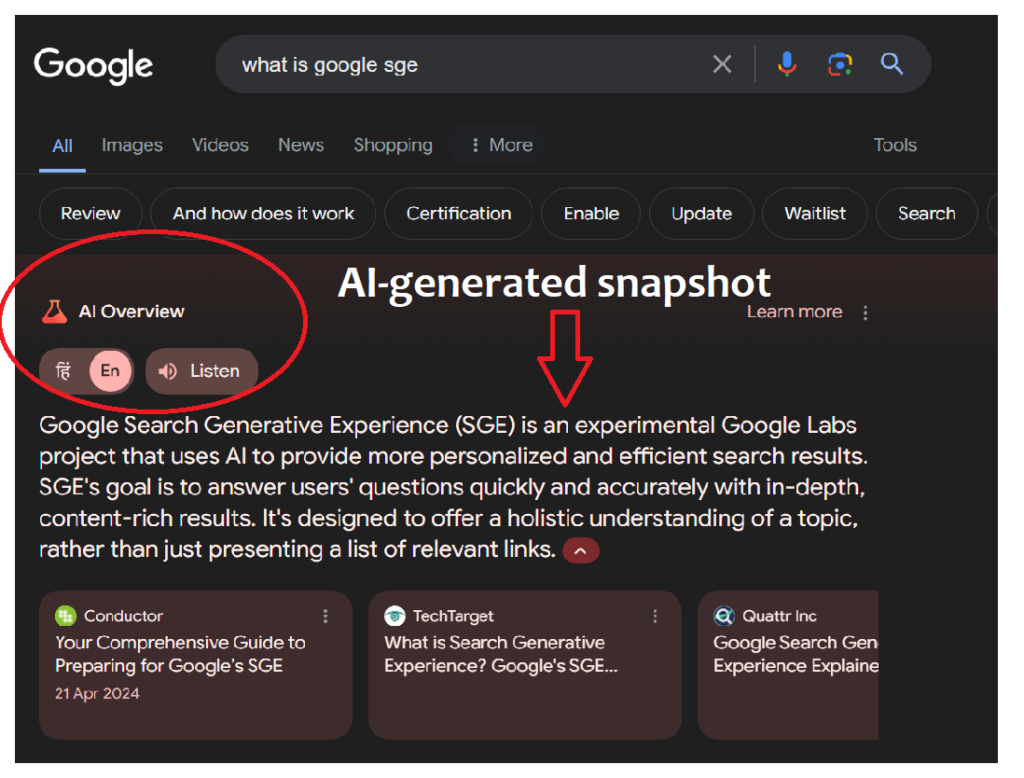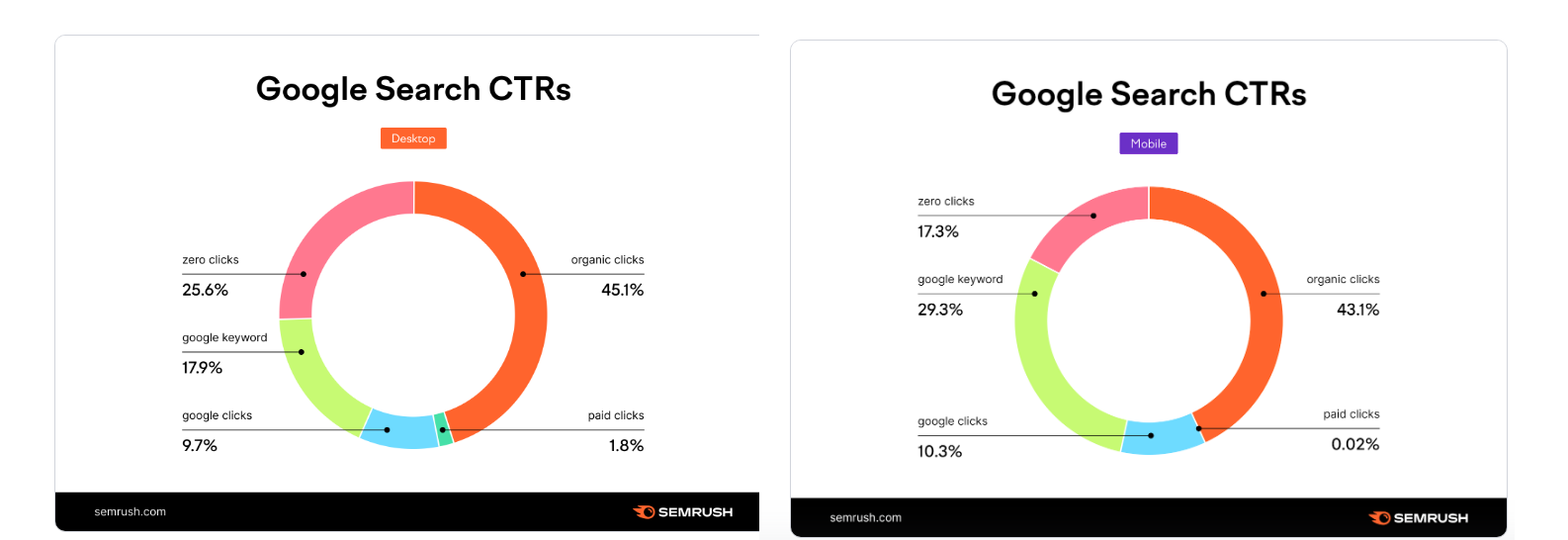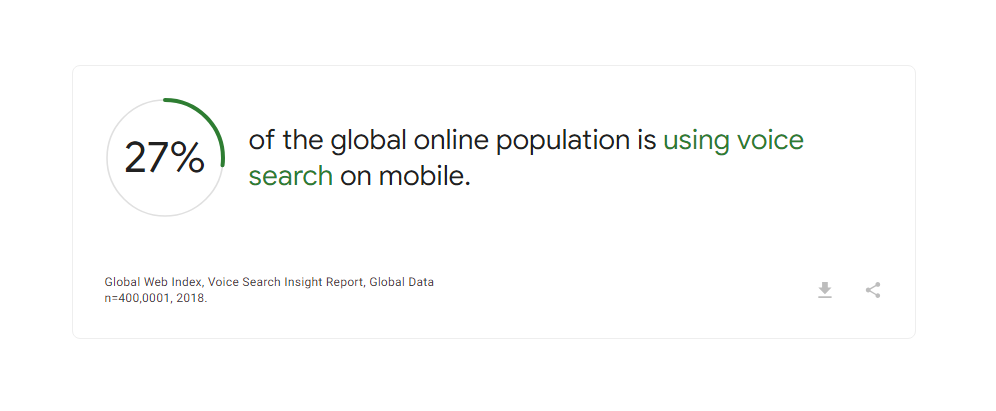
SEO is changing with time. Some strategies that worked previously may not work in future. With the development of AI, some new SEO trends are emerging that need to be dealt with.
In 2024, what critical trends will come in the way of SEO?
Let’s see in this article.
Google’s Search Generative Experience or SGE
The recent and most important SEO trend is surely Google’s new SGE. Since it has changed the whole way people search for things and get results, it has become critical.
If you don’t know, SGE is Google’s new generative AI. SGE stands for Search Generative Experience.
Google has added this to the top of SERPs (though still in experimenting form), which has raised questions about the future of SEO.

With this new change, if a user searches for any query on Google instead of those blue links or organically ranked web pages, Google shows an AI-generated snapshot of the information.
However, with this quick snapshot, Google also shows some websites and gives their reference links, which means search marketers can still get click-throughs, making SEO relevant.
How to deal with it?
Although SGE shows reference webpages in results, Google has not revealed what ranking factors make them appear. That means we have no clue if there are any specific optimisation criteria that need to be fulfilled for SGE.
However, according to some experts and observations traditional ethical SEO practices are important. So, for now, the answer to the dilemma of how to optimise for SGE is to focus on some of the regular or core SEO factors like high quality and backlinks with strong technical SEO.
Of all these factors, the most important one that even Google accepts is helpful content criteria. Since the increasing role of AI in search marketing, Google is continuously emphasising purely creating content to help users and not to manipulate rankings.
For this, Google introduced its EEAT ranking factor update, in which it recommends that people incorporate them in the content and consider those webpages with EEAT qualities as high-quality webpages.
Zero Click Searches
Zero-click searches are when users get their answers directly on top of SERPs without needing to click on a link to divert to a web page.
This reduces the potential web traffic for those who want to appear for the concerned query. This has obviously become a critical SEO trend, and as such, zero-click searches are increasing.
According to the Semrush State of Search report, 25.6% of desktop searches and 17.3% of mobile searches resulted in complete zero clicks.

Such zero-click search answers appear mainly for two reasons: the user’s intent and Google’s own SERP features like a knowledge panel, direct answer boxes, or conversion tools to concisely and precisely answer the question without any web page link underneath them.
User intent and Google SERP features answers are both interconnected. That means when the user is looking for quick information like contact details of a local business, wants quick calculations or wants basic knowledge about a personality like their age, birthplace or else.
Simply put, Google is obsessed with giving its users the best UX, so it provides them with quick and accurate solutions to as many queries as possible. This approach of Google sometimes costs search marketers click-throughs or even rankings.
How to deal with it?
While zero-click searches have some negative impacts on SEO, they also have something positive to offer. If you somehow manage to appear in these zero-click searches, you get position zero, which brings at least visibility and brand awareness, even if not clicks.
Now, how to optimise for zero-click searches is the question.
To optimise for position zero, the best thing is to present information in a concise and precise like that question-answer format, that is if your content is for informational queries. For that, FAQs obviously make a huge impact.
Precisely answering questions with the relevant information keywords increases the possibility of making you appear in feature snippets depending upon which kind of snippet, i.e., definition or bullet points, you want to secure.
To optimise the information in that way, keeping in mind the helpful content criteria obviously becomes important, as this is the most recent ranking factor that Google has to refer to.
However, as mentioned earlier, Googe has many advanced SERP features except feature snippets, so targeting others like knowledge panels or answer boxes is usually not recommended if you are still hoping to get clicks as they don’t show reference links along with them.
Read also: The Future of Search Engine Marketing: Trends and Strategies
Voice searches
AI has made so many things the new normal, including voice searches. AI technologies like Alexa and Siri, designed to get tasks done with a voice command, have made people more dependent on voice interaction compared to the traditional way of typing.
In short, voice searches are increasing, and this increase is becoming a new critical SEO trend.

Google searches are no exception to this. According to Google itself, in 2018, 27% of the global online population was using voice search on mobile, and in 2023, over 1 billion voice searches every month.
How to deal with it?
Voice searching is increasing and will continue to increase. So, the best way to deal with it is to adapt your SEO strategy to optimise your web pages or content for such searches.
If you know, voice searches are mostly conversational in nature. This means when users go for this method to put queries, they are looking for a concise and precise answer.
So, optimising accordingly becomes important. In this, searching for long-tail keywords that help you know what exactly is triggering people to search, i.e., intent, and targeting them to give their answer in a simple way, kind of simple definition helps a lot.
Plus, as it is about giving a straightforward answer, listing up your relevant long-tail keywords to answer them through FAQs is also a good strategy for voice search optimisation.
Here is: How to Digital Marketing Campaigns for Voice Search
Video SEO
With a person on an average of 17 hours of watching videos per week in 2023, suggesting that this trend is going to increase further in 2024.
People allocating this much amount of time to consume videos is surely not to wonder because videos are love, and I believe for everyone.
Maybe this is why YouTube videos are watched for 1 billion hours every day by 2 billion users.
And the amount of love Instagram reels and TikTok videos get is not to be mentioned.
Because videos are so in demand, even search engines give them enough weightage.
Google for many informational queries like “how to” or “tutorials” shows video results in SERPS, specifically those from YouTube.
Microsoft Bing is no exception to showing videos in search results.
This increasing consciousness of search engines towards video content makes it a crucial SEO trend in 2024.
This means as a search marketer, optimising videos to appear in search results of search engines is becoming an unneglectable SEO strategy for you.
How to deal with it?
- Target “how-to” & tutorial queries: People use videos for learning; optimise yours for those searches.
- Leverage YouTube SEO: Titles, descriptions, and tags all play a role in YouTube search.
- Don’t forget Bing: Optimize for Bing video search as well.
- It’s crucial SEO: Video optimisation is becoming a key SEO strategy.
That’s it!
We hope you successfully keep up with the latest SEO trends emerging. With new developments like AI and others, SEO, for sure, will keep adapting in 2024 and in future also. You can consider the above-mentioned tips to deal with the current SEO scenario, and for the future, keep an eye on our blog for the latest updates.
In case you are looking for an SEO consultant to discuss your Google rankings, you can talk to our experts. Give us a call at +91 901 276 4000
A team of digital marketing professionals who know the Art of making customers fall in LOVE with your brand!

Pingback: Advanced On-Page SEO Concepts: How to Optimize Pages & Beat Competition - Bitvero Digital Marketing